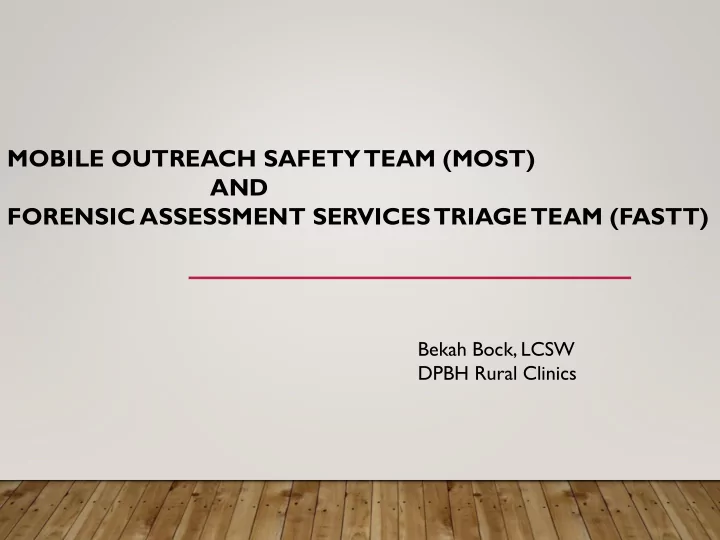

MOBILE OUTREACH SAFETY TEAM (MOST) AND FORENSIC ASSESSMENT SERVICES TRIAGE TEAM (FASTT) Bekah Bock, LCSW DPBH Rural Clinics
BACKGROUND … • 1800’s - Individuals with mental illness in jails • 1841- Dorothea Dix, journalist advocates for mental health hospitals • 1960’s US deinstitutionalization of individuals with mental illness - • Transitioning individuals with severe mental illness from long term psychiatric institutions to the community • Insufficient community supports lead to other types of institutionalization such as incarceration • In 44 states, more individuals are in single jail than the largest state psychiatric hospital • Largest mental health hospital in America- Cook County Jail in Chicago
CONSEQUENCES OF CRIMINALIZING MENTAL ILLNESS • Individuals with mental illness on average: • Have longer jail stays Have higher costs associated with incarceration • • Experience behavioral issues without treatment • See symptoms of mental illness worsen without treatment Often don’t get connected to treatment upon release - revolving door • • Are more likely to be victimized
STEPPING UP INITIATIVE: DIVERSION OF INDIVIDUALS WITH MENTAL ILLNESS FROM THE CRIMINAL JUSTICE SYSTEM
STEPPING UP INITIATIVE PROGRESS IN NEVADA
CONNECTING INDIVIDUALS WITH COMMUNITY TREATMENT AND SERVICES • Building initiatives to connect individuals with treatment to break cycle of recidivism • Successful treatment and community support • Reduces disruptive, assaultive, self injurious behaviors in the community • Increases public safety • Reduces public cost of repeat arrests and incarcerations
SEQUENTIAL INTERCEPT MODEL “Predictable points of contact offering opportunities for intervention”
MOBILE OUTREACH SAFETY TEAM • A clinician, law enforcement officer, (and sometimes paramedic) team with the purpose of providing community intervention and support to individuals who are experiencing behavioral health problems/ crisis
MOBILE OUTREACH SAFETY TEAM OBJECTIVES • Respond to suicidal/ mentally ill subject calls for service. • Respond to barricaded mentally ill individuals or other in-progress mental illness related crisis situations. • Follow-up on referrals generated by law enforcement, Mental Health Court, mental health professionals, and emergency service workers. • Outreach work with the mentally ill homeless population. • Referral to community resources and connection with community resource liaison • Proactive work with known mental health clients to maintain proper medication program compliance.
MOBILE OUTREACH SAFETY TEAM BENEFITS • Jail and ER diversion • Reduces call load for dispatch • Reduces law enforcement contact time • Increases public safety • Community intervention and support for individuals in chronic crisis
M.O.S.T. REFERRALS 1. To make a non-emergency referral for MOST : 2. Call dispatch 3. Tell dispatch you wish to make a MOST referral 4. Provide the following: 5. Your name, agency and contact information 6. Name of individual / individuals being referred 7. How the individuals can be contacted, i.e. address, phone number, etc. 8. Reason for referral: remember the more detail provided the better the MOST Team will be able to maintain safety and provide adequate service
FASTT: FORENSIC ASSESSMENT SERVICES TRIAGE TEAM • Treatment intervention and reentry program that is offered in the county jail. • Multi-disciplinary team from social services, mental health, substance use providers • Assesses the individual’s mental health, substance use, basic needs, (housing, medical, employment, transportation), and risk of reoffense.
FASTT BACKGROUND • Carson City 2013- • Partnership between State DPBH mental health, community coalitions, and forensic director of Carson City Jail, Dr. McEllistrem • Replicated in Lyon and Douglas Counties, coming soon to Churchill • Spreading statewide
FASTT OBJECTIVE • To reduce or eliminate reoffending and re-arrests by coordinating to connect individuals with needed treatment and services in the community
FASTT REFERRALS • From deputies • Judges • Clinician assessing in jail • Community providers • Family members
Recommend
More recommend